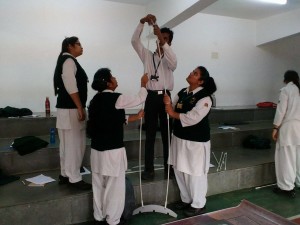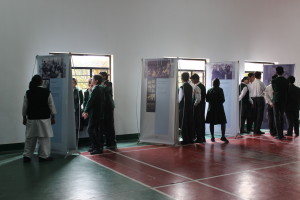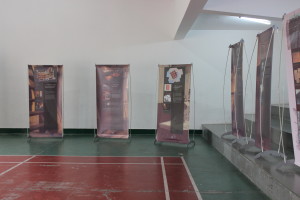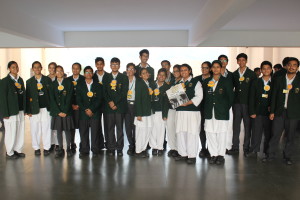‘Good morning Ma’am’, a chorus greeted us as we walked into the indoor games area at Delhi Public School [DPS] Patna. A group of twenty-seven middle and high school students armed with sheets of information on Anne Frank greeted us with big smiles on their faces—enough to dispel the early winter gloom.
After a brief round of introductions, we got straight down to work. Setting up the Anne Frank traveling exhibition is straightforward enough and after showing the peer guides how to set up one panel, they took over. I explained to them that as peer guides, this exhibition was theirs. They were to set up—put the panels together as well as arrange the panels in such a way that it would offer guests a good viewing experience.
After some mild arguments, laughs and agreeing to disagree, with a much needed tiffin break in between, the panels were up. Ownership towards the exhibition was immediate; I spotted many of them, individually and in groups, pretend to be visitors.
Once the panels were set up, to everyone’s satisfaction, except for a few adjustments that were still necessary, we settled down in a circle, to discuss the exhibition and what being a peer guide entailed.
A few of them had read the Diary of Anne Frank. One of the students volunteered to give the others an account of what the diary was about and another student gave a very brief account of the background of what had happened at that time, why Anne had to go into hiding. The peer guides then took some time to quietly observe the panels after which we discussed if there was any panel that spoke to them in particular. One of the students mentioned the panel which describes the dreams Anne had for the future. ‘We all have dreams of what we want to become, this student said, so did Anne’. Many spoke of the fact that Anne, like them, was a young teenager. A teenager, who by rights should be talking about things like school, friends, going out. Not facing discrimination and the possibility of death.
‘Our problems seem so trivial compared to what she went through. We worry about such small issues like getting a smart phone or being able to go out for movies.’
‘I can’t imagine having to live in such a cramped space.’
‘Imagine uniforms as a point for discrimination.’
After doing a short practice of guiding in pairs, we gathered again for a game on social exclusion. This fun and energetic game involves participants being divided up into two groups, with a few ‘outcasts’. The outcasts must do their best to get in to any one of the groups, and the participants in the groups must do their best to keep them out. While this did involve a lot of laughter and mock arguments, even some cajoling and promises of treats at KFC, the peer guides quickly zeroed in on the main aim of the game—that social exclusion exists everywhere.
‘I remember an instance where a friend was teased so much about his skin colour, he moved away.’
‘There is discrimination everywhere. At home, in the school.’
A roster for guiding duties set up, a final run through and slight adjustments, whispers of ‘polish your shoes’ . . . and the guides were ready.
–Paroma Sengupta




